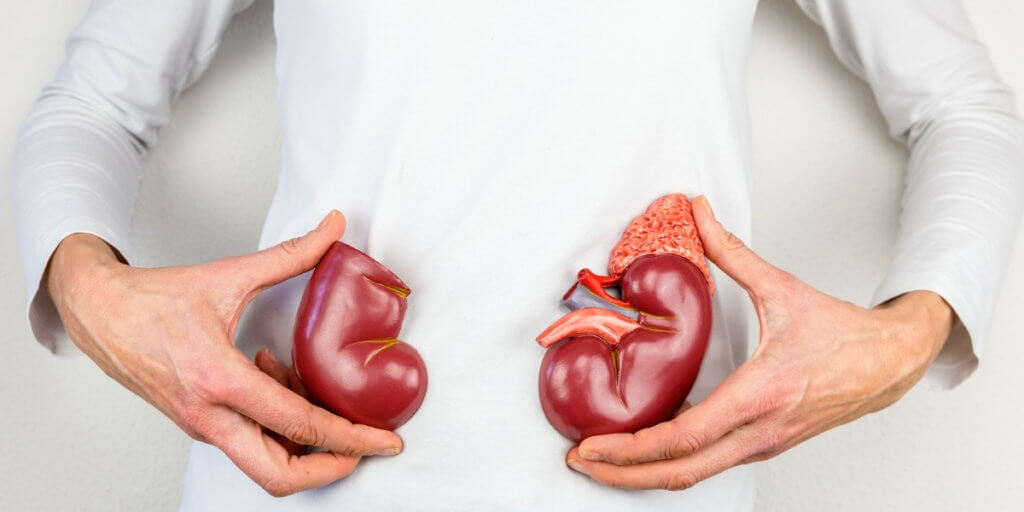
It’s National Kidney Month! Your kidneys are bean-shaped and located below your ribs in your back, and are a very important part of your body. They have several functions; transport waste from your blood, regulate your fluid levels, activate Vitamin D so your bones remain strong and healthy, direct production of red blood cells, regulate blood pressure, and keep blood minerals in balance. Your kidneys filter approximately a half cup of blood every minute, making sure all waste and extra water is removed. This is what creates urine. Your kidneys also make hormones which is how they are able to regulate your blood pressure, make red blood cells, and activate Vitamin D to keep your bones strong and healthy.
The NIH suggests asking your doctor these three questions:
1) Have I been tested for kidney disease and how healthy are my kidneys?
2) How often should I get my kidneys checked?
3) What should I do to keep my kidneys healthy?
It’s important to bring awareness to kidney diseases because more than 9 out of 10 people with kidney disease don’t even realize they have it. So, get in touch with your doctor, ask them these three questions, and in the meantime, here are some facts about your kidneys and what kidney disease is.
Chronic Kidney Disease
Chronic Kidney Disease, also known as CKD or Chronic Kidney Failure, is a disease in your kidneys, which means they aren’t functioning the way they should to filter waste out of your blood. When your kidneys aren’t filtering blood, this leads to a buildup of toxins, which is what makes the disease chronic. It is important to have your kidneys checked for CKD, because if your kidneys are letting toxins buildup in your body for too long, it can lead to kidney failure. It's very common in adults in the United States. About 30 million adults in the U.S. have CKD and 9 out of 10 people don’t realize they have it. This is because your kidneys are working so hard and you have two of them, and often symptoms don’t show until you have more advanced CKD.
Symptoms
Symptoms of CKD don’t really show in the beginning stages, which is why it is important to ask your doctor those three questions (1. Have I been tested for kidney disease and how healthy are my kidneys, 2. How often should I have my kidneys checked, and 3. What should I do to keep my kidneys healthy?).
Symptoms for advanced CKD include:
• Chest pain
• Dry skin, itching or numbness
• Feeling tired
• Headaches
• Increased or decreased urination
• Loss of appetite
• Muscle cramps
• Nausea
• Shortness of breath
• Sleep problems
• Trouble concentrating
• Vomiting
• Weight loss
• Swelling of the face, hands, abdomen, ankles and feet
• Blood in urine or foamy urine
• Puffy eyes
• Difficult or painful urination.
Who is at Risk for CKD?
Those who are at a higher risk for CKD are people with diabetes, those with high blood pressure, heart disease, having a family history of kidney failure, and those over the age of 60. There is also a higher chance for CKD based on your ethnicity. There are higher rates of diabetes and high blood presure among those that are African American, Hispanic, and American Indians.
Community Care Physicians
Community Care Physicians is proud to have two convenient nephrology offices located in Schenectady and Slingerlands. Our respected nephrologists are specially trained in kidney conditions and abnormalities. Early detection and treatment can often keep chronic kidney disease from getting worse. Kidney disease symptoms rarely show in the early stages, making it that much more important to speak with a practitioner,
CapitalCare Nephrology – located at 2125 River Road Suite 303A, and can be reached at (518) 831-2500.
CapitalCare Family Practice Slingerlands – located at 1882 New Scotland Road, Suite 200, and can be reached at (518) 439-2460.
Learn more about our nephrology practices and their knowledgeable providers here.
If you’d like to know more about our Nephrology practices or are in need of a primary doctor, CCP’s Concierge Care Coordinator would be more than happy to answer any questions you might have and help direct you in the right direction. Call (518) 782-3800.
Sources
https://www.niddk.nih.gov/health-information/communication-programs/nkdep/get-involved/national-kidney-month
https://www.niddk.nih.gov/health-information/kidney-disease/chronic-kidney-disease-ckd/what-is-chronic-kidney-disease
https://www.kidney.org/content/national-kidney-month
https://www.kidney.org/
https://www.niddk.nih.gov/health-information/kidney-disease/kidneys-how-they-work/p>
